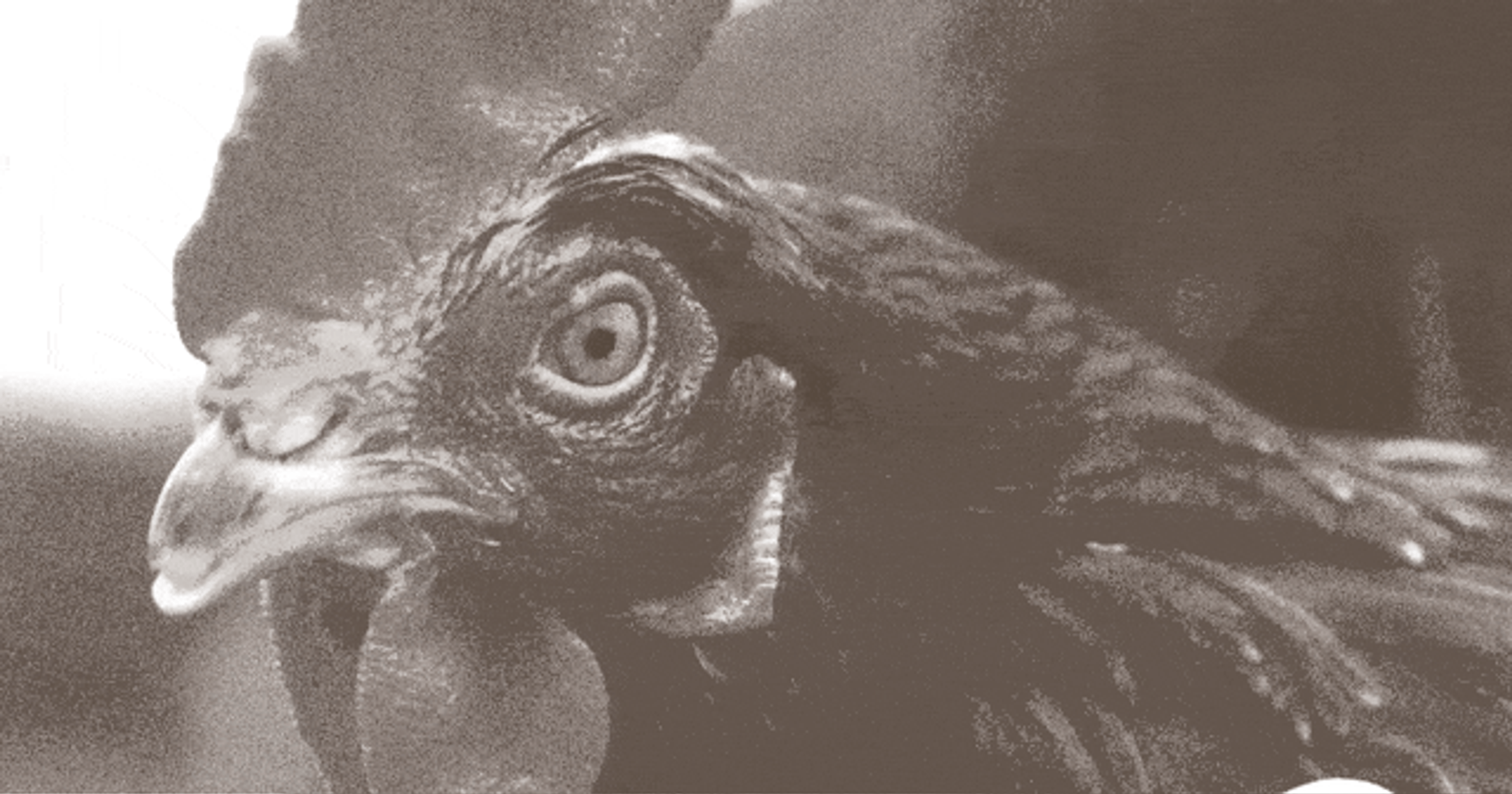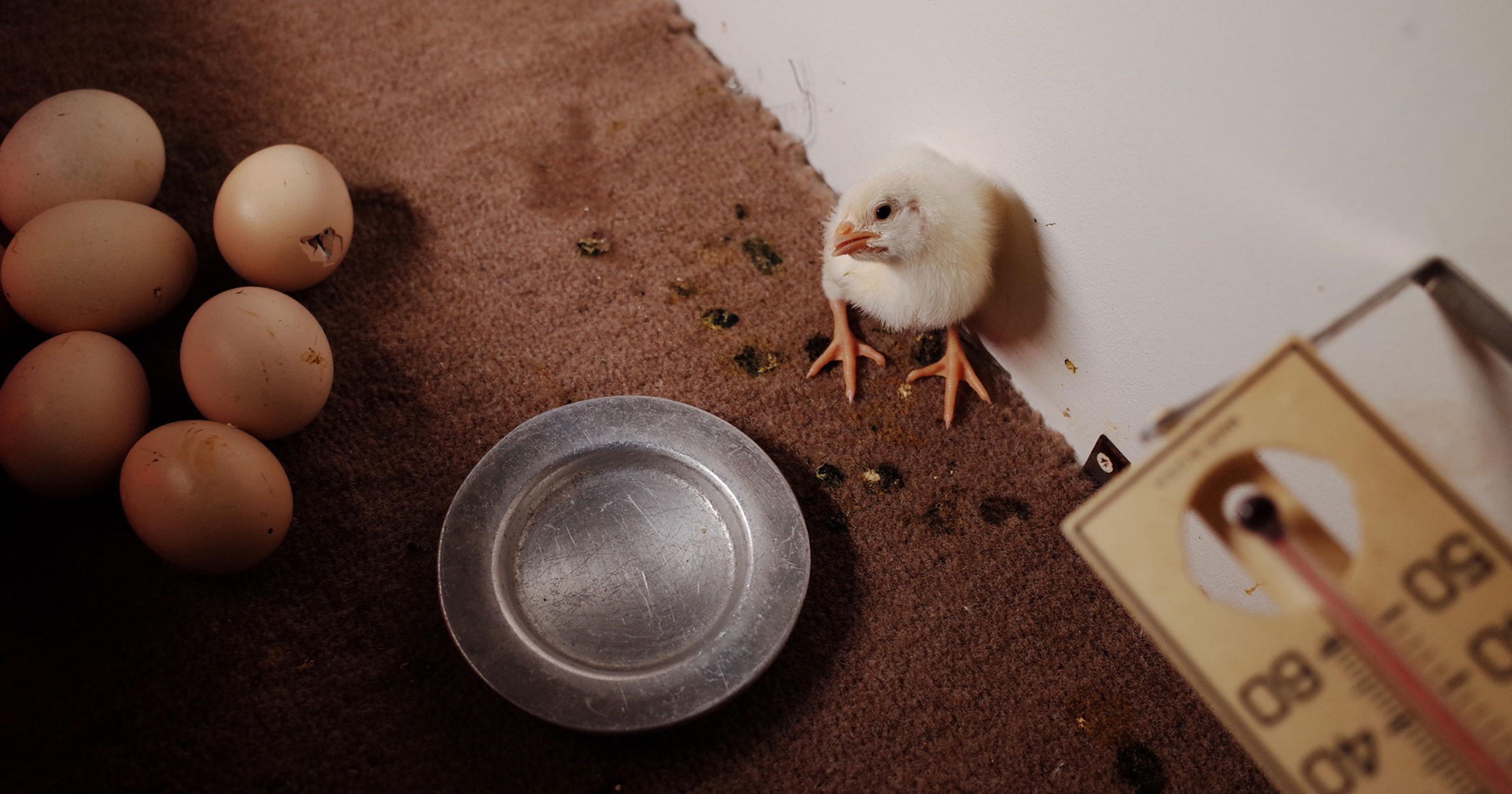Male chickens are prohibited in most urban and suburban municipalities. What happens when you accidentally adopt one?
Last February, desiring eggs but not wanting to support factory farming, I purchased three fluffy, day-old chicks from a beloved local farm store. I grew up with my mother’s chickens; I loved their small clucking dramas around the discovery of earthworms and the way they hurtled toward me whenever I appeared with a spoonful of leftover oatmeal. My teen daughter and I raised them in our bathroom, cuddling and hand-feeding Jolene, Rosemary, and Ophelia for three months before releasing them on our suburban ⅓-acre. But in June, tragedy struck.
Jolene began to crow.
Look up animal ordinances for cities around the U.S., and you’ll see the same non-negotiable statement: “No person shall keep roosters.” The call of a rooster can reach 130 decibels; compare that to a dog’s bark (80-90 dB) or a gas-powered leaf blower (same), and the ban against roosters in cities makes sense.
Roosters start to crow between two and five months of age. Before that unmistakable signal, determining the chick’s sex would be quite challenging for your average backyard chicken owner. But after a few months, many owners have bonded with their bird; they’ve hand-fed and named him — likely something feminine — learning his personality as they would a dog or cat. It can be devastating to find that instead of an egg a day, their pet has just offered up a whole carton of grief.
After Jolene’s crow, I walked around my neighborhood, telling my tale of woe to everyone I met. Reactions ranged from “I don’t even hear him” to “I think it’s sweet.” But in July, I got a text from a neighbor I hadn’t spoken with yet.
“Do you know where the rooster lives?” she wrote. “His crowing is incessant!!!!! Are roosters allowed in city limits?”
“Jolene’s mine,” I admitted. “He’s leaving.”
I had no idea how difficult it would be to rehome him.
Flaws in the Backyard System
Avian flu outbreaks, egg scarcity, skyrocketing food prices, and sheer boredom helped to inspire the pandemic-era backyard chicken boom. A 2024 study published in Animals found that people in the U.S. now own 85 million backyard chickens. Myself, I wanted eggs without facing a moral dilemma about hens in deplorable conditions every time I went to the market. And as anyone who has ponied up for ethically raised eggs knows, they aren’t cheap — I wanted to cut out the middleman.
In a warm, bright alcove off the farm store’s main room, my daughter and I chose chicks from bins labeled Speckled Sussex, Black Moran, and Lavender Orpington. The teen employee who took our $15 didn’t explain that one or more might be a rooster. I trusted the owners to source their chicks from a conscientious hatchery at which someone had sexed the babies. Big mistake.
Arizona residents Sara and Jacob Franklin made the same mistake. During the pandemic, they adopted several chicks from their neighbors. “It was silly of us to think that our neighbors could produce all hens for us,” Jacob admitted. “It’s best practice to anticipate at least fifty percent male when you’re getting chicks.”
Inspired by their flock, the Franklins wrote Through their Eyes: A Revolutionary Guide to Rooster Care and created the companion podcast Roovolution. Now, they field emails from frantic owners like me; they also network with sanctuary owners perpetually full-up with roosters. “They have to turn so many people away when the alternative is a death sentence,” Sara said.
Many of these sanctuaries are a part of Adopt a Bird Network. Members of the nonprofit work to find permanent homes for adoptable ducks, geese, and chickens in animal rescues and shelters. Their website includes a list of 215 chicken rescue organizations, including Hen Harbor near Santa Cruz.
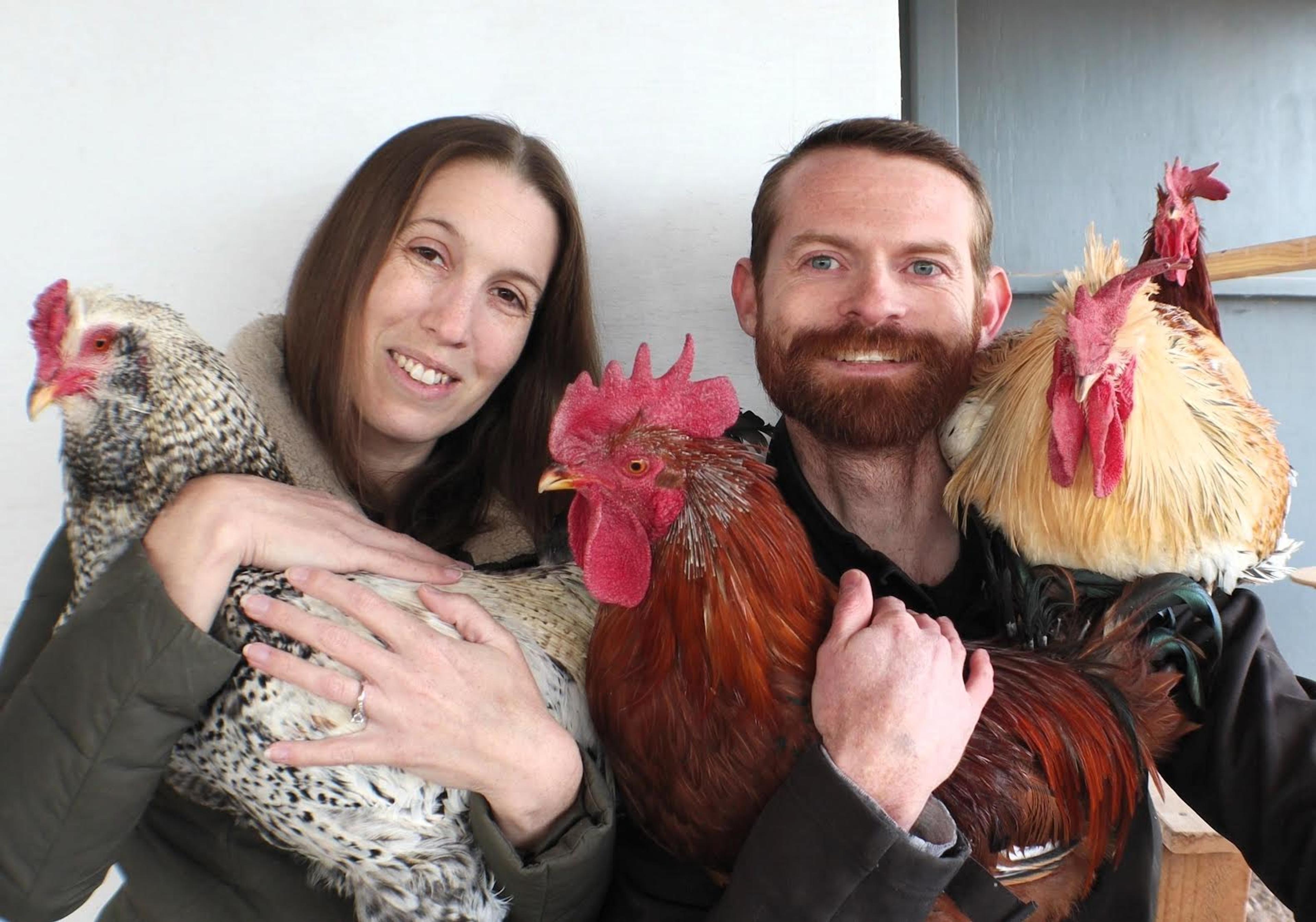
Sara and Jacob Franklin with their four accidental roosters
Hen Harbor’s founder, Ariana Heumer, worked for the Humane Society before opening a nonprofit chicken rescue. She planned to adopt mature hens from the commercial egg-laying industry — chickens in need of a home. Now, she lives with 50 outdoor roosters.
“I took one,” she said. “But once someone knows you have a rooster, every other homeless rooster in the county is going to be at your door.”
Heumer doesn’t fault the owners desperate to find their male birds a good home. Rather, she’s furious at the lack of oversight and education around the purchase of chicks. “Why are the unwitting consumers being punished and not the hatcheries?” she asked. “Why are you allowed to sell roosters in areas where they’re banned?”
Before she accepts a bird, she asks the owners to write a letter to their city council, describing the negative impact of the anti-rooster ordinances. “Even though I know the laws aren’t going to change, the city council will get the idea, and maybe they’ll help to stop this issue from getting worse,” Heumer said.
She also asks owners to try listing their rooster on rescue sites. “I know it’s not going to work, but I ask you to do it so I know you made an effort,” she explained.
The Near-Impossibility of Rehoming
The month Jolene began to crow, two of my friends discovered that they, too, had accidental roosters. One butchered hers and made them into treats for her dogs. The other, Debbie Williamson Smith, created a social media ad. In it, a black rooster with fluffy neck feathers appears to gaze into the camera. “WANTED,” the ad read. “A flock to call my own. Me: I’m a vibrant and passionate ARIES rooster looking for love. You: A flock of hens attracted to a bearded man.”
Williamson Smith refers to herself as “Chief Henfluencer” of Fuster Cluck Farm, located near the farm store where we’d both purchased our chicks. “There’s no easy way to sex chickens,” she said. “I knew roosters were a possibility.” Over years of backyard chicken keeping, she’s found herself with four adolescent roosters and placed them in good homes thanks to her witty social media posts on backyard chicken-owning groups.
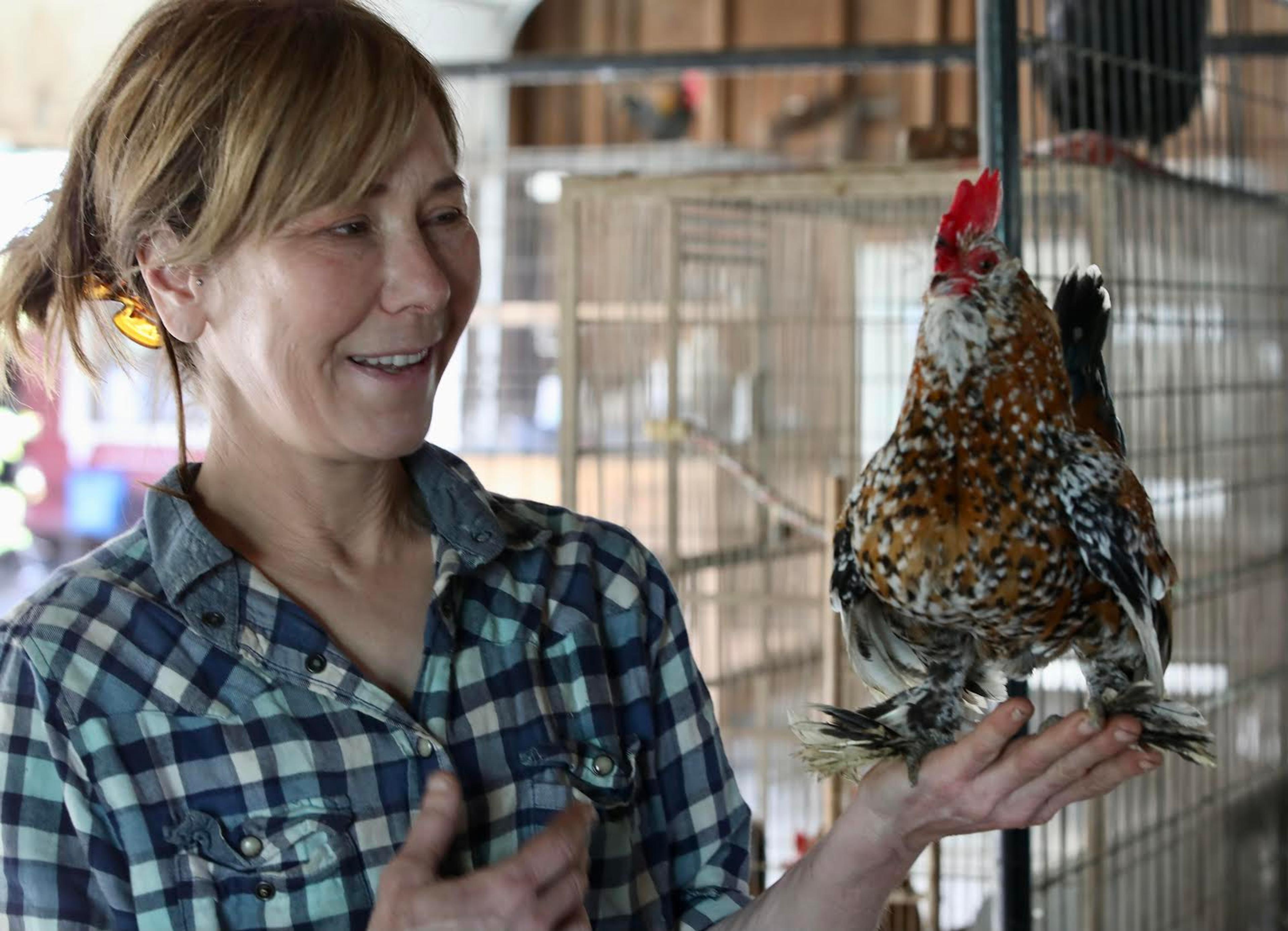
Sanctuary owner Ariana Heumer with one of her 50 roosters
But she’s the exception. Visit any social media farming group, and you’ll read post after post of desperate owners looking to rehome their pets.
Free!!! gifting a white silkie rooster, 4 months old! We’re not allowed to keep him.
One of my new chicks is a rooster, 3 months old, Rhode Island Red free to good home. Anyone?????
Does anyone want an aggressive rooster who is only good for stew? He’s MEAN.
I dutifully made Jolene an ad and posted it to Facebook farming groups. His beautiful, red-feathered head appeared in profile under the words “FREE: Tall, handsome and speckled gentleman. He’s an excellent protector of females.” I added a speech bubble under his beak. “For a good time,” it read, “email my owner.”
The post received laughing-face emojis and hearts. But not a single person offered to adopt him.
Seeking Solutions
Dannica Wall works as a research specialist for Prestage Poultry Science at North Carolina State University. There are ways, she said, of ensuring owners don’t find themselves with a decibel-busting roo.
Wall suggested that people purchase chicks from a reputable source skilled at feather-sexing in a process that involves fanning out the wing feathers of a day-old chick. “If the feathers are even across the bottom, you have a male,” she said. “If the bottom feathers are longer than the top feathers, you have a female. When you don’t know, you automatically categorize them as male.”
Few farm stores, whether a chain or independently owned, can guarantee the sex of the chicks they sell. Instead, many hold rooster roundups in which they invite owners to return unwanted male chickens; staff teach community members how to kill roos humanely and process them for meat. It’s far kinder, Williamson Smith noted, than dumping a rooster in a park where it starves to death or gets ripped apart by predators.
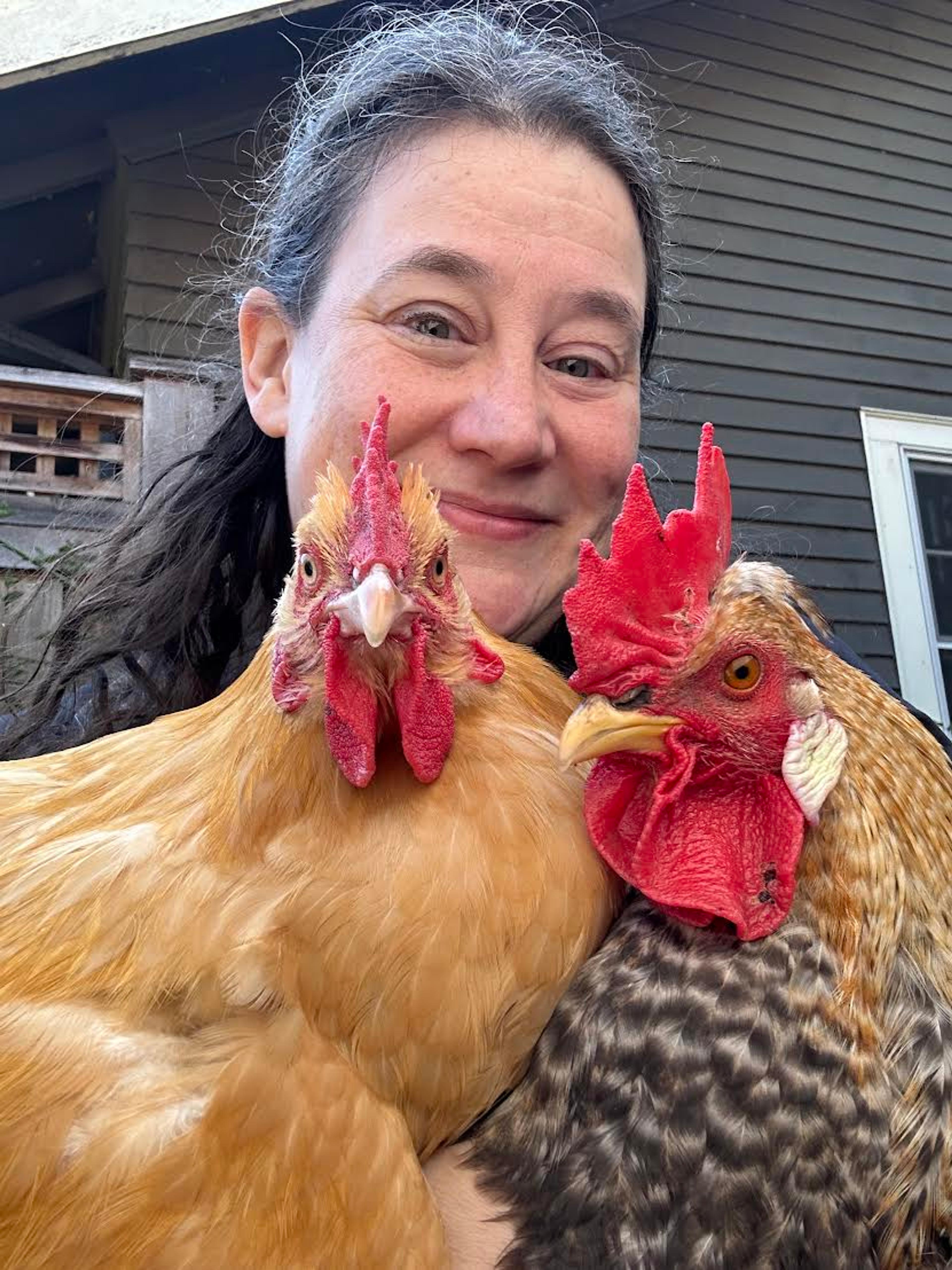
Debbie Williamson-Smith of Fuster Cluck Farm
“Events like the roundup make sure a rooster has only one bad moment,” she explained. “They don’t suffer because someone has dispatched them humanely.”
Our farm store offered a rooster roundup. I missed it by a week.
The Franklins upended their lives to save their four accidental roosters. They moved from Phoenix to unincorporated land outside of Kingman and invited their flock inside. “We both worked from home,” Sara explained, “so we hauled their fluffy butts on in and put them in diapers.” They’re in the midst of building an outdoor chicken run. “The plan is for them to choose when they want to go outside and play; they get to come in when it’s time for bed and stay in when the weather is unfavorable,” she said.
Sanctuary owner Ariana Heumer, like numerous members of the Adopt a Bird Network, urges people to adopt adult hens as an alternative to the baby chick crapshoot. I did a search of all the Facebook groups on which I’d posted an ad for Jolene; in less than five minutes, I discovered three owners in my area attempting to rehome their egg-laying hens.
*
In buying baby chicks, I’d congratulated myself for avoiding the cruelties of commercial chicken farming. My naivete came back to peck me in the ass. Now, I see that I simply helped to perpetuate an industry that harms both birds and humans.
For now, I’ve trained Jolene to sleep inside our laundry room. At dusk, he and his hens walk up a ramp to a cage on the washing machine. But I’m breaking the law. And I’m pissing off at least one of my neighbors.
That knock on the door, that order to cease and desist, is coming. For now, I step away from my computer for the 20th time in a day to distract JoJo from crowing. I walk him into the laundry room. Then, I return to my computer and sit down to research chicken diapers.
